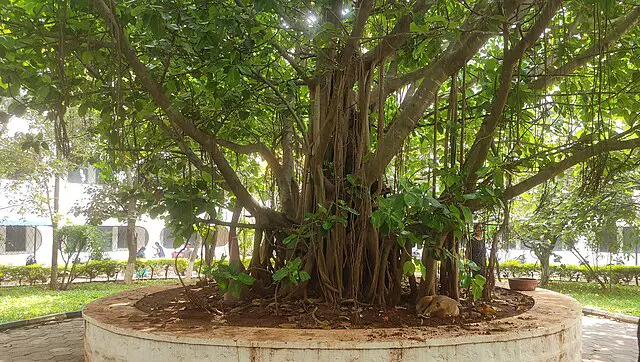It’s 1898 in the dusty plains of what’s now Pakistan. A British officer, decked out in full colonial swagger, is pacing in fury because a tree refused to move out of the way. So naturally, he arrests it.
No, this isn’t satire. This actually happened.
A single acacia tree was placed under official arrest. Chains, arrest papers, and all. And over a century later, it’s still “jailed.” That tree, now known as the “arrested tree,” has become a symbol of just how absurd colonial arrogance could get, and how nature somehow always has the last laugh.
Meet the Offender: One Tree, Zero Regrets
The story goes like this: in the summer of 1898, a somewhat tipsy British officer, reportedly annoyed at how slowly his carriage was progressing down the road, blamed a nearby tree for obstructing his royal path.
Rather than go around it like a normal person, he did what only an empire intoxicated with its own self-importance would do. He ordered the tree arrested.
According to oral accounts, the officer instructed his men to wrap the tree in iron chains. A notice was posted declaring that this acacia was now a “prisoner under arrest.” And there it stood. No court date. No lawyer. Just an unrepentant tree being treated like it had committed treason.
Because of course, when your ego’s that big, even trees are suspect.
Still Shackled. Still Standing.
Here’s the kicker: the tree is still there. Over 125 years later.
Located inside the military cantonment of Landi Kotal, near the famous Khyber Pass, the acacia remains encircled by a rusting chain. There’s even a plaque nearby that tells the story, though whether it’s more of a joke now or a warning, no one really knows.
Locals and soldiers alike have kept the tree’s legacy alive, partly because it’s hilarious, and partly because it’s… oddly profound. It’s become a strange little monument to imperial absurdity.
And honestly? It deserves that spotlight.
Colonial Logic: When Ego Outweighs Oxygen
This wasn’t just a drunk officer being ridiculous. Well, okay it was mostly that.
But it also speaks to the twisted logic of colonial rule. When a tree could be arrested just because it stood in the way of a man with a mustache and too much power, it wasn’t really about the tree. It was about dominance.
If you think about it, colonialism wasn’t just about land or resources. It was about control. Down to the level of plants. Crops were regulated. Forests were monetized. And in this bizarre case, an uncooperative tree became a minor act of rebellion.
Maybe that’s why the story still resonates. Because the tree didn’t bend. It didn’t bow. It didn’t apologize. It just stood there, quietly refusing to care.
The Payoff: What This Tree Can Teach Us
Why should we care about a chain-wrapped acacia in Pakistan?
Because in its quiet absurdity, the story says a lot. It reminds us how bizarre history can be. How power makes people do laughably stupid things. And how sometimes, resistance can look like… just standing your ground.
Literally.
In a way, the arrested tree has outlived its oppressor. It’s become a local legend. A meme before memes. A botanical middle finger to arrogance. And honestly? I kind of love that.
Final Thought: The Best Kind of Prisoner
Some monuments are built. Some are born. And some are just minding their own business when a uniformed human decides they’re a threat.
But time has a way of sorting out the foolish from the legendary.
So if you’re ever near the Khyber Pass and you see a chained tree standing in the sun, give it a nod. That thing’s doing life for a crime it didn’t commit. And somehow, it makes the rest of us feel a little freer.
Sources:
1. BBC News: The Tree That Was Arrested
2. Dawn: The Curious Case of the Chained Tree
3. Atlas Obscura – The Arrested Tree

